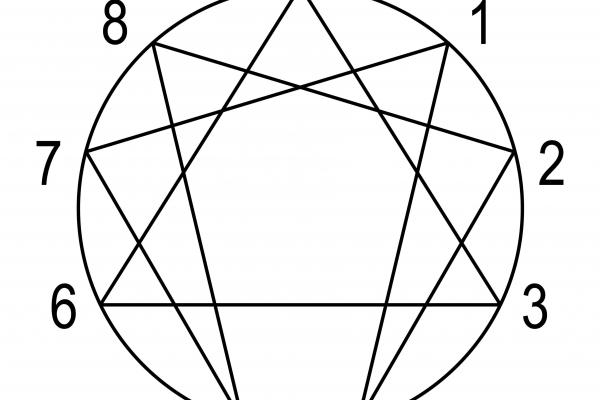About 10 years ago, I was introduced to the Enneagram through a book discussion with a small group at my church. The Enneagram is often used as a personality typing system in which every person has a type designated by numbers one through nine. Each number names a person’s core motivations, what they look like when healthy and unhealthy, their temptations and giftedness, and how they relate to people of the other types. For example, ones are “reformers” driven by a perfectionist motivation, twos are “helpers” who care about meeting the needs of others, threes are “achievers” who value public accomplishment, and so on.
At the time I discovered it, I found the Enneagram a useful tool for providing a vocabulary of the self. It helped me understand not only my own motivations for my actions but also gave my friends a common language for understanding our differences.
In the decade since, I’ve seen a sharp rise in the popularity of the Enneagram. An “Ennea-thought” email delivers a daily meditation for each type. There’s even an Enneadog twitter feed that matches gifs of dogs with the different types. Over the last few years, it feels like the Enneagram has become inescapable among evangelical and mainline Christians. Any conversation over matters of significance winds down to, “What’s your type?” The implication being that the answer holds the key to understanding the person and their point of view, allowing for the conversation to proceed forward. But I’ve found that it usually just derails the conversation into discussing the finer points of one’s type.
Why this focus on the Enneagram and the complexity of self-discovery at this moment?
In an interview with Religion News Service, Ian Morgan Cron, co-author of The Road Back to You: An Enneagram Journey to Self-Discovery and the co-host of the popular Enneagram podcast Typology, explained his take on the rise of the enneagram’s popularity saying, “In our world now, a lot of the institutions that helped people to understand who they were are gone, or they don’t have as much influence.”
Though this diagnosis is right, Cron misses that while the traditional institutions that helped people understand themselves might have diminished in influence, people aren’t left on their own. Those institutions have been replaced. People may spend less time in church, but they spend more time at their jobs, in line at the grocery store, buying things online. Institutions still help us understand who we are, but those institutions are Wal-Mart, Amazon, and Netflix, not the local church, softball league, or union. So how do those institutions help us understand ourselves?
Most working Americans wake up each morning to commute from home, community, and family, to spend time producing something that generates a value. They might produce cars in a factory, sales in an Apple Store, warm feelings and assistance over the phone in the form of customer service. Their product is sold, and they receive a portion of the value back while their boss and a corporation take a portion of that value.
Our present economic system alienates us from both our work and one another. Further, the endless pursuit of profit whether out of greed for a few or desperation and necessity for most, grows quite tiresome and proves ultimately hollow. These institutions help us understand ourselves, and the understanding they instill is one of alienation, fragmentation, and disorder.
From this angle, the obsession with the Enneagram is born out of a desire to bridge the gap of alienation that capitalism forces us to live with. It’s an attempt to rediscover something about ourselves we’re being robbed of, an attempt to hold onto relationships torn apart by our material and economic circumstances. I’m not opposed to overcoming this alienation, but I worry that a tool for self-discovery won’t do the trick. It leaves in place the material and economic structures that render us alienated in the first place. Jeff Bezos is probably quite happy to have Amazon workers discussing their various types during their time off rather than organizing a union.
One reason the Enneagram works well within the capitalist system of work is its intense focus on individuals. The Enneagram reduces arguments of substance to those of procedure, but not typical formal procedure like raising a motion in a meeting according to Robert’s Rules of Order, but emotional procedure based on how each person involved in the argument feels, hears, and understands the substance of what’s being discussed.
A church staff discussion on whether or not to distribute goods to the poor shifts into a conversation about the Enneagram types of the people involved and how to best tailor a message to them in ways that incorporates their core motivations according to the Enneagram. The Enneagram shifts the conversation towards how people feel good according to their type rather than whether or not they are good according to a life of faithful discipleship.
Conflict becomes a matter of mathematics, not power. It’s about finding the right balance of each individual type, where they fall on the scale of health and integration, and the perfect messaging. The Enneagram holds out hope that when brought down to a micro level, we can resolve any and all conflicts before they begin.
But our problems aren’t happening at the micro level. They’re matters of classes and power. The central conflict we need to engage is Amazon, Wal-Mart, and Google versus the rest of us, not a six learning how to get along with two.
What I find most worrying about the Enneagram and the Christians obsession with it is that I don’t see much of an alternative. It feels like the we live with a foreclosed future. It’s difficult to imagine a world with a better distribution of the value workers produce, a world with time for family and friends, or institutions whose purpose is something other than the endless pursuit of profit.
I find the Enneagram helpful as any tool for self-knowledge is helpful, but self-knowledge can only go so far. The way in which we use the Enneagram fails because we don’t simply need better tools to work on ourselves, we need ways to collectively work together. Self-knowledge is no substitute for collective action. We need to form institutions and collectives that enable us to rise above ourselves to something other than a world of endless conversations about how a Seven Wing Eight relates to a Three Wing Two.
Absent those better tools, sitting around discussing our personality types might be the best we can do, and I have to admit that the best we can do seems woefully inadequate to what we need.
Got something to say about what you're reading? We value your feedback!






